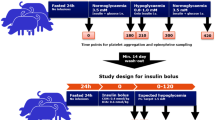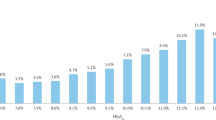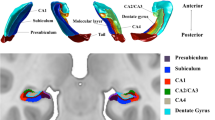Abstract
Mechanisms underlying cognitive dysfunction in young diabetic children are poorly understood, and may include synaptic dysfunction from insulin-induced hypoglycemia. We developed a model of repetitive insulin-induced hypoglycemia in young rats and examined hippocampal long-term potentiation, an electrophysiologic assay of synaptic plasticity, 3–5 d after the last hypoglycemic event. Three hypoglycemic events between postnatal d 21–25 produced modest cortical (17 ± 2.9 dead neurons per section in parasagittal cortex), but not hippocampal, neuron death quantified by Fluoro-Jade B staining. There was no change in neurogenesis in the hippocampal dentate granule cell region by quantification of bromodeoxyuridine incorporation. Although normal baseline hippocampal synaptic responses were elicited from hippocampal slices from hypoglycemic animals, long-term synaptic potentiation could not be induced in hippocampal slices from rats subjected to hypoglycemia. These results suggest that repetitive hypoglycemia in the developing brain can cause selective impairment of synaptic plasticity in the absence of cell death, and without complete disruption of basal synaptic transmission. We speculate that impaired synaptic plasticity in the hippocampus caused by repetitive hypoglycemia could underlie memory and cognitive deficits observed in young diabetic children, and that cortical neuron death caused by repetitive hypoglycemia in the developing brain may contribute to other neurologic, cognitive, and psychological problems sometimes encountered in diabetic children.
Similar content being viewed by others
Log in or create a free account to read this content
Gain free access to this article, as well as selected content from this journal and more on nature.com
or
Abbreviations
- LTP:
-
long-term potentiation
- Hex:
-
hexamethonium chloride
- HI:
-
hexamethonium chloride plus insulin
- EPSP:
-
excitatory postsynaptic potential
- BrdU:
-
bromodeoxyuridine
- PBS+:
-
PBS with 10% goat serum and 0.3% Triton X
- DAPI:
-
4′,6-diamidino-2-phenylindole
References
Northam EA, Anderson PJ, Werther GA, Warne GL, Adler RG, Andrewes D 1998 Neuropsychological complications of IDDM in children 2 years after disease onset. Diabetes Care 21: 379–384
Rovet JF, Ehrlich RM 1999 The effect of hypoglycemic seizures on cognitive function in children with diabetes: a 7-year prospective study. J Pediatr 134: 503–506
Ryan CM, Becker DJ 1999 Hypoglycemia in children with type 1 diabetes mellitus. Risk factors, cognitive function, and management. Endocrinol Metab Clin North Am 28: 883–900
Davis EA, Keating B, Byrne GC, Russell M, Jones TW 1998 Impact of improved glycaemic control on rates of hypoglycaemia in insulin dependent diabetes mellitus. Arch Dis Child 78: 111–115
Hagen JW, Barclay CR, Anderson BJ, Feeman DJ, Segal SS, Bacon G, Goldstein GW 1990 Intellective functioning and strategy use in children with insulin-dependent diabetes mellitus. Child Dev 61: 1714–1727
Rovet JF, Ehrlich RM, Hoppe M 1987 Intellectual deficits associated with early onset of insulin-dependent diabetes mellitus in children. Diabetes Care 10: 510–515
Daneman D, Frank M, Perlman K, Tamm J, Ehrlich R 1989 Severe hypoglycemia in children with insulin-dependent diabetes mellitus: frequency and predisposing factors. J Pediatr 115: 681–685
Ryan C, Vega A, Drash A 1985 Cognitive deficits in adolescents who developed diabetes early in life. Pediatrics 75: 921–927
[No authors listed] 1997 Hypoglycemia in the Diabetes Control and Complications Trial. The Diabetes Control and Complications Trial Research Group. Diabetes 46: 271–286
Hershey T, Bhargava N, Sadler M, White NH, Craft S 1999 Conventional versus intensive diabetes therapy in children with type 1 diabetes: effects on memory and motor speed. Diabetes Care 22: 1318–1324
Northam EA, Anderson PJ, Jacobs R, Hughes M, Warne GL, Werther GA 2001 Neuropsychological profiles of children with type 1 diabetes 6 years after disease onset. Diabetes Care 24: 1541–1546
Schoenle EJ, Schoenle D, Molinari L, Largo RH 2002 Impaired intellectual development in children with type I diabetes: association with HbA(1c), age at diagnosis and sex. Diabetologia 45: 108–114
Boland E, Monsod T, Delucia M, Brandt CA, Fernando S, Tamborlane WV 2001 Limitations of conventional methods of self-monitoring of blood glucose: lessons learned from 3 days of continuous glucose sensing in pediatric patients with type 1 diabetes. Diabetes Care 24: 1858–1862
Kaufman FR, Austin J, Neinstein A, Jeng L, Halvorson M, Devoe DJ, Pitukcheewanont P 2002 Nocturnal hypoglycemia detected with the Continuous Glucose Monitoring System in pediatric patients with type 1 diabetes. J Pediatr 141: 625–630
Malenka RC, Nicoll RA 1999 Long-term potentiation—a decade of progress?. Science 285: 1870–1874
Hershey T, Lillie R, Sadler M, White NH 2003 Severe hypoglycemia and long-term spatial memory in children with type 1 diabetes mellitus: a retrospective study. J Int Neuropsychol Soc 9: 740–750
Havel PJ, Veith RC, Dunning BE, Taborsky GJ 1991 Role for autonomic nervous system to increase pancreatic glucagon secretion during marked insulin-induced hypoglycemia in dogs. Diabetes 40: 1107–1114
Havel PJ, Akpan JO, Curry DL, Stern JS, Gingerich RL, Ahren B 1993 Autonomic control of pancreatic polypeptide and glucagon secretion during neuroglucopenia and hypoglycemia in mice. Am J Physiol 265: R246–R254
Wong M, Wozniak DF, Yamada KA 2003 An animal model of generalized non-convulsive status epilepticus: immediate characteristics and long-term effects. Exp Neurol 183: 87–99
Schmued LC, Hopkins KJ 2000 Fluoro-jade B: a high affinity fluorescent marker for the localization of neuronal degeneration. Brain Res 874: 123–130
Howard CV, Reed MG 1998 Unbiased Stereology: Three-Dimensional Measurement in Microscopy. Springer Verlag, New York, 39–54.
Izumi Y, Yamada KA, Matsukawa M, Zorumski CF 2003 Effects of insulin on long-term potentiation in hippocampal slices from diabetic rats. Diabetologia 46: 1007–1012
Hopkins KJ, Wang G, Schmued LC 2000 Temporal progression of kainic acid induced neuronal and myelin degeneration in the rat forebrain. Brain Res 864: 69–80
Altman J, Das GD 1965 Autoradiographic and histological evidence of postnatal hippocampal neurogenesis in rats. J Comp Neurol 124: 319–335
Gage FH 2000 Mammalian neural stem cells. Science 287: 1433–1438
McCabe BK, Silveira DC, Cilio MR, Cha BH, Liu X, Sogawa Y, Holmes GL 2001 Reduced neurogenesis after neonatal seizures. J Neurosci 21: 2094–2103
Barkai L, Vamosi I, Lukacs K 1998 Prospective assessment of severe hypoglycaemia in diabetic children and adolescents with impaired and normal awareness of hypoglycaemia. Diabetologia 41: 898–903
Biessels GJ, Kamal A, Urban IJ, Spruijt BM, Erkelens DW, Gispen WH 1998 Water maze learning and hippocampal synaptic plasticity in streptozotocin-diabetic rats: effects of insulin treatment. Brain Res 800: 125–135
Auer RN, Olsson Y, Siesjo BK 1984 Hypoglycemic brain injury in the rat. Correlation of density of brain damage with the EEG isoelectric time: a quantitative study. Diabetes 33: 1090–1098
Parent JM, Yu TW, Leibowitz RT, Geschwind DH, Sloviter RS, Lowenstein DH 1997 Dentate granule cell neurogenesis is increased by seizures and contributes to aberrant network reorganization in the adult rat hippocampus. J Neurosci 17: 3727–3738
Liu J, Solway K, Messing RO, Sharp FR 1998 Increased neurogenesis in the dentate gyrus after transient global ischemia in gerbils. J Neurosci 18: 7768–7778
Dash PK, Mach SA, Moore AN 2001 Enhanced neurogenesis in the rodent hippocampus following traumatic brain injury. J Neurosci Res 63: 313–319
Hershey T, Craft S, Bhargava N, White NH 1997 Memory and insulin dependent diabetes mellitus (IDDM): effects of childhood onset and severe hypoglycemia. J Int Neuropsychol Soc 3: 509–520
Acknowledgements
The authors thank Dr. Tamara Hershey, Dr. Philip Cryer, Dr. Steven Rothman, and Dr. Mark Goldberg for helpful discussions. We are grateful to Dr. Larry Schmued for advice on using Fluoro-JadeB.
Author information
Authors and Affiliations
Corresponding author
Additional information
Supported by NIH grants DK20579 and NS042774.
Rights and permissions
About this article
Cite this article
Yamada, K., Rensing, N., Izumi, Y. et al. Repetitive Hypoglycemia in Young Rats Impairs Hippocampal Long-Term Potentiation. Pediatr Res 55, 372–379 (2004). https://doi.org/10.1203/01.PDR.0000110523.07240.C1
Received:
Accepted:
Issue date:
DOI: https://doi.org/10.1203/01.PDR.0000110523.07240.C1
This article is cited by
-
Recurrent Hypoglycemia Exacerbates Cerebral Ischemic Damage in Diabetic Rats via Enhanced Post-Ischemic Mitochondrial Dysfunction
Translational Stroke Research (2019)
-
Ketogenic diet in a patient with congenital hyperinsulinism: a novel approach to prevent brain damage
Orphanet Journal of Rare Diseases (2015)
-
Acute hypoglycemia results in reduced cortical neuronal injury in the developing IUGR rat
Pediatric Research (2015)
-
Diabetes and Epilepsy in Children and Adolescents
Current Diabetes Reports (2015)
-
Female mice heterozygous for creatine transporter deficiency show moderate cognitive deficits
Journal of Inherited Metabolic Disease (2014)



